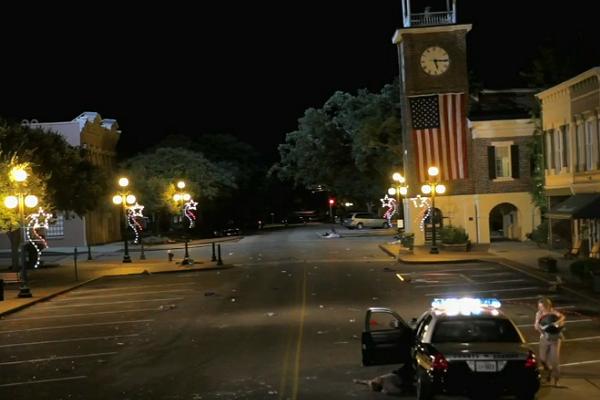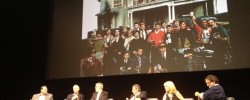
Review: The Bay (2012)
Cast: Kristen Connolly, Jane McNeill, Christopher Denham
Director: Barry Levinson
Country: USA
Genre: Horror | Sci-Fi | Thriller
Official Trailer: Here
Editor’s Note: The Bay opens in limited release on Friday
A constant niggling issue, albeit a relatively minor one, tied to the found footage film is the question of the finding: how has this footage reached our eyes; why are we seeing these often intimate, always horrific images? It’s not a question that need necessarily be answered by the film—the impetus of its horror, for instance, is of far greater concern—yet not doing so can detract from the faux-realism on which the aesthetic so desperately depends. After all, isn’t it the intent of found footage to break through the wall of assurance we find in thinking “it’s only a movie”?
The root of The Bay’s power lies in its ability to subvert conscious viewership, to seem as though it really is a documentary; above any found footage horrors, perhaps its closest point of comparison is Louie Psihoyos’ The Cove. It shares that film’s sense of undercover exposé…
 Bringing the respectability and prestige of his name to a shooting style now considered well past the point of tedium, Barry Levinson bores through that wall with rigorous intent in The Bay. More mockumentary than found footage, it’s a film styled as a collage of videos cobbled together by investigative reporter Donna Thompson, one of few survivors of a “tragedy” that occurred in Maryland in 2009. Through a considerable array of sources—police car cameras, IM services, CCTV, home movies—the nature of the tragedy is gradually revealed by Levinson, or rather by Donna: the extensive use of her character both in voiceover and in her own footage of the day is essential to the construction of The Bay not as a fiction film directed by Barry Levinson, but as a documentary directed by Donna Thompson.
Bringing the respectability and prestige of his name to a shooting style now considered well past the point of tedium, Barry Levinson bores through that wall with rigorous intent in The Bay. More mockumentary than found footage, it’s a film styled as a collage of videos cobbled together by investigative reporter Donna Thompson, one of few survivors of a “tragedy” that occurred in Maryland in 2009. Through a considerable array of sources—police car cameras, IM services, CCTV, home movies—the nature of the tragedy is gradually revealed by Levinson, or rather by Donna: the extensive use of her character both in voiceover and in her own footage of the day is essential to the construction of The Bay not as a fiction film directed by Barry Levinson, but as a documentary directed by Donna Thompson.
It’s a remarkable feat that a film so notable for the distinct directorial presence behind it could bear a voice so indistinct, so devoid of personality. The root of The Bay’s power lies in its ability to subvert conscious viewership, to seem as though it really is a documentary; above any found footage horrors, perhaps its closest point of comparison is Louie Psihoyos’ The Cove. It shares that film’s sense of undercover exposé, its environmental themes—almost immediately pollutants are revealed as the source of this epidemic—approached with a fiery passion: this story should be told; it must be told. It’s a film that works not just as thrilling, terrifying entertainment, but also as rousing social discourse; acting also as producer and credited for story, Levinson approaches his film with a striking clarity of purpose, his intent first and foremost to educate his audience in the pertinent real-world concerns.
Levinson has an assured understanding of the machinations of horror; The Bay frightens not through vapid jump scares nor grotesque imagery, but through the prominent realism with which these events are presented. Scarcely has found footage been better used, certainly not in recent years
 Above all else, what makes this impassioned pontification successful is the brutal efficiency with which it uses the tropes of its genre. Levinson has an assured understanding of the machinations of horror; The Bay frightens not through vapid jump scares nor grotesque imagery, but through the prominent realism with which these events are presented. Scarcely has found footage been better used, certainly not in recent years: the tenets of reality on which the aesthetic was established as a form of cinematic storytelling are implemented to their full potential here. It helps immeasurably that it’s a narrative painstakingly entangled with the truth of the world, its biological and medical accuracies neatly avoiding all conceits to present this as a thing which could really happened; which, in fact, has happened, albeit to lesser extents.
Above all else, what makes this impassioned pontification successful is the brutal efficiency with which it uses the tropes of its genre. Levinson has an assured understanding of the machinations of horror; The Bay frightens not through vapid jump scares nor grotesque imagery, but through the prominent realism with which these events are presented. Scarcely has found footage been better used, certainly not in recent years: the tenets of reality on which the aesthetic was established as a form of cinematic storytelling are implemented to their full potential here. It helps immeasurably that it’s a narrative painstakingly entangled with the truth of the world, its biological and medical accuracies neatly avoiding all conceits to present this as a thing which could really happened; which, in fact, has happened, albeit to lesser extents.
The horrifying frankness of The Bay’s events and the ultimate possibility of their occurrence earns it a key position in the history of the found footage film, indeed makes it one of the finest exemplars thereof. It’s not without its flaws—performances and dialogue tend to waver in certain less exciting scenes; Donna’s voiceover seems oddly calm at times—yet the way it expertly avoids the pratfalls of the majority of its technical brethren evinces the fact that, in the right hands, found footage is much more than just the cheap gimmick the endless flow of mediocre mainstream usages suggest. It’s a means to expose the terror of the real, to elicit an evocative confrontation with the predominant ills of the world, to incite serious consideration of social issues. Levinson’s voice might not be heard in any auteurial predilections, but it’s instantly identifiable in the assurance of his film, its brave and bold committal to being more than just a movie.
Related Posts
![]()
Ronan Doyle
![]()
Latest posts by Ronan Doyle (see all)
































